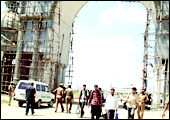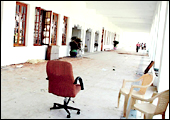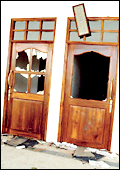 |
|
Going home: Asked to vacate their hostels, Sathyabama's
engineering students head home
|
KATTANKULATHUR,
KANCHIPURAM DISTRICT NEAR CHENNAI
February 27
It
was nearing midnight on February 27th, but no engineering student
in the hostels of SRM Institute of Science & Technology at
Kattankulathur was asleep. It is not unusual for students at engineering
colleges to burn the midnight oil. But today, it wasn't the approaching
exams that played on their minds. Rather, the students were rattled
by a bigger question-one concerning their very future. On February
16, the All India Council for Technical Education (AICTE), the
regulatory body for technical education across the country, issued
a notice stating that "all institutions" offering technical
education should obtain AICTE approval before March 7. That meant
deemed universities, which have always regarded the University
Grants Commission (UGC) and not AICTE as their master, would need
to get such an approval or lose the right to offer and award degrees
for technical courses.
Earlier in the day, worried students had
tried to find out from the institute's management whether their
courses were certified, but no clear answers were forthcoming.
So at midnight, when the "minders" hired by the management
to keep protests under check were away, the technical students
decided to give vent to their frustrations. It started off as
a regular protest-a lot of shouting and banner-raising-but soon
descended into stone-throwing. Windows were smashed and some computers
and equipment damaged. But before the students could inflict too
much damage, the police arrived and lathi-charged them. According
to the institute, 22 students were arrested, but G. Selva, President
of Students Federation of India (SFI) in Tamil Nadu, says the
number was only eight. "The parents of those students were
not informed immediately by the institute, and they spent two
days in jail. It was SFI that got them out on bail," says
Selva.
 |
|
Seeking answers: Empty corridors and shattered window
panes at Sathyabama in the wake of student protests
|
SRM wasn't the only institute at the receiving
end of student ire. The first protests occurred at the Vinayaka
Mission's Research Foundation in Salem, followed by SRM and then
another famous institution in Chennai, Sathyabama Deemed University,
promoted by Jeppiaar, a former legislator in the mgr government.
At Sathyabama, the protests took place on March 1, when the students
failed to get a convincing reply from the management and started
pelting stones at the institute's building. In fact, on March
3, soon after the violent protests at Sathyabama, Robin Vaas,
20, a third-year student of electrical and electronics engineering,
hanged himself at a relative's house. The reason behind the suicide
was not immediately clear. In contrast, the other affected institutes
in and outside of Tamil Nadu have largely been peaceful.
Profiting From Loopholes
What's the row about? Under the existing
regulations, a university can only be set up by a central or state
act. But a decade after India's independence, the government had
found out a way to speed up the spread of institutes of higher
education. In 1956, UGC passed an act allowing deemed universities
to come up. Deemed universities aren't actually universities (in
that they are not set up by a central or state act), but affiliated
to one, but independent for all practical purposes. They can set
up their own courses, and administer them with almost no interference.
There had always been fight between AICTE and the deemed universities
over the former's right to certify their technical courses. But
the Supreme Court sort of tipped the balance in favour of the
deemed universities, when it ruled in 2001 (in a fight between
Bharatidasan University and AICTE, although the former was a proper
university and not a deemed one) that they were exempt from AICTE
regulations. With the result, while just 29 deemed universities
came up between 1956 and 1990, in the 10 years to 2000, 26 of
them were notified as deemed universities. Between 2001 and 2005,
36 such universities came into being.
 |
|
Uncertain future: Engineering classes at the troubled
colleges are expected to resume later this month
|
Because the UGC Act allows the deemed universities
complete autonomy, some of them have turned themselves into a
money-making racket. In states such as Tamil Nadu, Karnataka and
Hyderabad, most of these technical colleges have a "management
quota" that allows them to admit students for a large capitation
fee (it can range between Rs 5 lakh and Rs 8 lakh). Given that
some of these colleges admit as many as 5,000 engineering students
a year, there's Rs 200 crore to be made in capitation fee alone.
No wonder, there's been a rush to get the deemed university status.
In the process, the quality of technical education at most of
these institutions has suffered-a primary reason behind the AICTE
crackdown.
With the AICTE saying that all institutions
would need their certification or lose the right to offer degrees
in technical courses, the choice for the deemed universities is
to either fall in line or give a BSc degree instead of, say, a
be or BTech degree. Of course, in the job market, a BSc degree
is far less valuable than a be degree. Says a former Vice Chancellor
of Anna University: "MNCs hiring engineers from here ask
for the AICTE approval, since they cannot be monitoring the quality
of hundreds of colleges.'' Confirms R. Chandrasekaran, Managing
Director, Cognizant Technology Solutions: "Cognizant has
historically recruited graduate engineers only from premier technical
universities and engineering colleges. We have never, and shall
not in future, recruit from engineering colleges that are not
bona fide, and do not issue legitimate degree certificates approved
by the AICTE."
 |
 |
|
Paying the price: Computers and windows bore the
brunt of students' ire at the SRM Institute
|
Getting Them To Submit
For the hundreds of technical students in
India's deemed universities that is the big worry. When BT went
to press, the chancellors of SRM, Sathyabama and Vellore Institute
of Technology had said that they would abide by UGC rules and
even allow AICTE inspection if the Madras High Court so ordered.
On March 15, at a Madras High Court hearing, the central government
informed the court that AICTE was empowered to lay down norms
for technical institutes, including those of deemed universities,
and that the AICTE had the right to inspect them. The counter
petition filed by the deemed universities had argued that the
AICTE could not take any arbitrary action, such as non-recognition
of courses, and must refer all matters to the UGC.
As for the troubled deemed universities in
Chennai, classes have commenced for the non-technical courses,
but the engineering courses will restart on the 21st of this month.
It's likely that the fight between the deemed universities and
the AICTE will not end here but reach the Supreme Court. When
it does, the apex court should simply put all technical courses
under the purview of the AICTE. The country's students don't deserve
to be short-changed.
|








